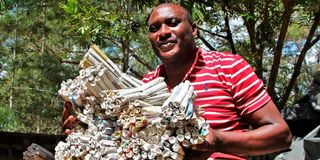Kitui farmers doing it their way

A strong earthy aroma of tobacco leads the Powering SMEs team to Dennis Mwangangi’s homestead in Kilonzo Village, Kitui County. The Nairobi-based tour operator is among a handful of tobacco growers in the semi-arid region who have set the cash crop on a revitalisation path.
“A kilo of tobacco leaves produces 135 rolls after shredding. A roll fetches Sh10 in the market. We target retailers in small trading centres dotting Machakos and Makueni counties where homemade cigarettes are very popular because they are affordable,” Mwangangi says.
Sheltered under a croton tree at a corner of the compound, six workers with machetes are bent over heaps of dried tobacco leaves as boda boda operators periodically deliver sacks of the commodity, leaving no doubt that the homestead is a hub of tobacco production. The workers shred the leaves methodically using machetes, marking the onset of the production of cigarettes, which ends with rolling the shredded leaves in used newspaper cuttings.
Although Mwangangi ventured into tobacco farming in 2016, he has quickly joined a league of prominent tobacco growers in a region known for cultivating maize. The Covid-19 pandemic led him here. When the government imposed travel restrictions to curb the spread of the disease, he relocated to the countryside.
Determined to tap a new revenue stream, the trader has increased to 22 the acreage under tobacco. As luck would have it, his first yield was impressive. He harvested 3,100 kilos. That year he opened doors to neighbours who wanted to dispose of their harvest instead of ferrying it to Kitui Town, spurring a steady comeback of the commodity in the region.

Workers shred dried tobacco leaves at Dennis Mwangangi’s home in Kilonzo Village in Kitui County. Neighbouring farmers who would rather not transport their produce to Kitui town sell it to him.
A youthful Robert Wathe produces snuff known locally as kang’alikya. It has become so popular among young people in Ukambani region that authorities are getting concerned.
Kitui County
“Tobacco leaves from Meru County are mild compared to those grown in Kitui County. We acquire the two varieties of tobacco leaves and blend them to come up with a more desirable product,” says Wathe, whose business is located at an unassuming building in Kitui Town.
Throughout the year, tens of workers pound special tobacco leaves into a pulp of uniform consistency before sprinkling it with vegetable cooking oil and using their hands to make kang’aalikya. The new markets have renewed hope of the revival of the cash crop.
“Tobacco is our biggest cash crop in Kitui Central. No other crop comes closer in terms of value. Even at the height of drought, tobacco has enabled farmers to educate their children in this region,” adds Simon Makau, the chairman of Kitui Tobacco Growers Cooperative Society.
That notwithstanding, authorities and residents concur that the region has not realised its full potential in terms of tobacco production. Julia Karimi, who has grown the crop for years, says the high cost of inputs has discouraged farmers, while Matheus Kauti, the Dean of Agriculture at South Eastern Kenya University, believes that competing interests in a region where the size of farmlands has been reducing rapidly as the population in the area ballooned over the years has dealt a big blow to tobacco farming in Kitui Central region.
“Aggressive campaigns against tobacco by environmentalists, some churches and some development agencies have had the most devastating effects on tobacco farming in Kitui County. Environmentalists link the curing of tobacco to deforestation, while some churches preach against cigarettes, with the World Health Organization linking the nicotine contained in tobacco to a myriad of diseases, including cancer,” Dr Kauti told Powering SMEs in an interview.
“Over the years, however, the drought resistant crop has shrugged off these pressures. In recent years, for instance, we have seen a growing interest in tobacco farming among a group of farmers in pockets of Kitui County. Many farmers believe it is the crop of the future since it comes to their rescue when other crops succumb to drought,” he added.
The cultivation of tobacco starts with the establishment of a nursery.

Julia Karimi harvests tobacco leaves at her farm in Mathulini Village in Kitui County. Tobacco growers here prefer to produce their own cigarettes, it is more lucrative.
“We establish our nursery around August 24 guided by the onset of the short rainy season. Around the same time, the preparation of farmland through setting up bunds to enhance water retention starts. We transplant immediately the short rainy season starts. Three days after transplanting we apply fertiliser on the crop,” says Gabriel Uhuru, who has grown tobacco for 40 years.
Three months
The leaves take two to three months to be ready for harvesting. Tobacco harvesting takes place between February and June. Flue curing, where leaves are hung in curing barns and heated air is generated to dry the leaves gives them their distinctive aroma. They stay three days in the barn, whose temperature is regulated.
British American Tobacco, BAT, introduced the crop in the region 80 years ago, and signed contracts with farmers here. Two derelict barns towering defiantly at the heart of the vibrant Kitui Town are a tragic tale of an industry which has seen better days. When BAT officials allowed farmers to cure tobacco on their own under close supervision, they had no idea they were fattening an informal market. BAT gave way to Mastermind Tobacco Kenya Limited in the 1980s. It pulled out of the Kitui market three years ago.
A kilo of dried tobacco leaves fetches between Sh400 and Sh500 on average in open air markets in Kitui County. It fetches half the price when sold through the cooperative society. According to Maweu, the informal market has injured the competitiveness of the cooperative society.
“Most of the emerging tobacco farmers are not interested in the cooperative society. They prefer selling their produce in the informal market. We are in talks with Mastermind Tobacco Kenya and other companies to secure a better market,” Maweu says.





